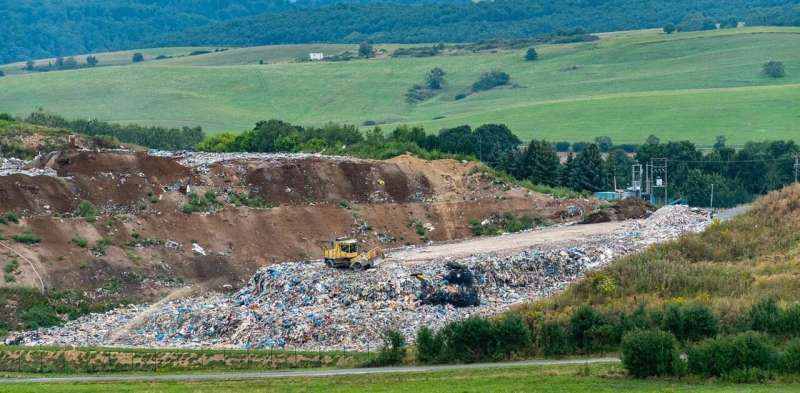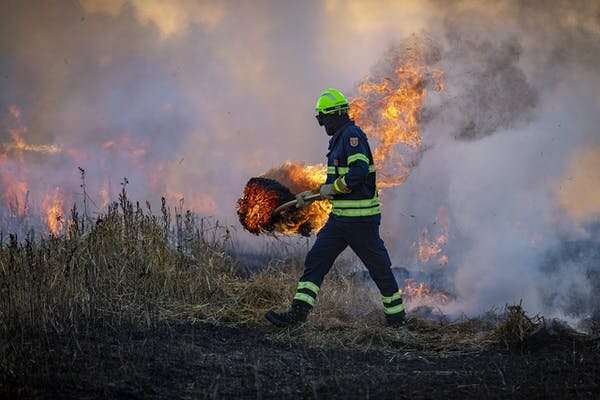The term 'Anthropocene' isn't perfect, but it shows us the scale of the environmental crisis we've caused

Earlier this year, scientists identified early warning signs of the collapse of the Gulf Stream, an ocean current that influences the climate of the North American east coast and much of western Europe.
This long-feared tipping point would have catastrophic consequences across the globe, such as potentially disrupting rain patterns on which billions of people rely for food security.
The news came after a year of climate disasters. New York City's skies were shrouded in smoke from wildfires on the West Coast in July, while Germany experienced its deadliest floods in half a century in the same month.
Increasingly frequent extreme climate events make it clear that human action is changing the composition of our planet's environment. The term often used for this new era of history is the "Anthropocene."
It's long been taught that the Holocene is our current geological era, a relatively stable period in Earth history that began some 11,500 years ago at the end of the last ice age. But the word Anthropocene recognizes the dawn of an epoch in which human beings have become the dominant force shaping the Earth's geology.
Problems
"Anthropocene" was first used in an academic context in 2001, but it's now emerging within wider cultural conversations about climate change.
I use the word often in my own research into education systems' responses to the climate crisis, because I believe it's more apt to talk about "educating for the Anthropocene" than "educating for the 21st century." The former phrase carries an urgency stronger than the arbitrary marker of a new century.
However, the word admittedly has its problems. It puts all humans into a single category, as if we were equally responsible for environmental destruction. Yet the hundreds of millions living in areas disproportionately affected by climate change, like Bangladesh or the Maldives, are the victims—not the perpetrators—of this crisis.
The western world, with its legacy of colonialism, is in fact overwhelmingly responsible for the global changes we're now seeing. This becomes clear when we consider the proposed starting dates for the Anthropocene epoch.
The year 1610, one of the main candidates for a start date, marked the lowest recorded levels of carbon dioxide in history, as well as the beginning of humanity's ability to alter the chemical composition of the Earth's atmosphere at a global scale.
But this change was not a result of some 'neutral' activity. In fact, it was the outcome of a reduction in farming following the genocide of over 50 million indigenous people across America caused by European colonization.

Other key dates within the epoch are intimately linked to colonial exploits, such as the year 1776. This was the year James Watt invented the steam engine, sparking the industrial revolution that enabled acts of British colonialism such as occupying regions of Canada, Australia, Asia, and the African continent.
And 1945—another proposed starting date—brought the Trinity Test, the first detonation of a nuclear bomb. This led to more than a decade of nuclear tests mostly on colonized territories such as the Marshall Islands, a country that continues to be haunted by sky-high rates of thyroid cancer and dependency on foreign aid. All of these examples point unambiguously to the powerful influence of western countries' actions on our current climate situation.
Alternatives to this term abound. "Anglocene", "Capitalocene" and "Oliganthropocene" have all have been put forward as possibilities that better capture the responsibility for our current climate crisis. These terms refer to a different group, such as the rich or those living in the English-speaking world, as the main driver of environmental decay.
Solutions
But I stick to using "Anthropocene." For all its problems, the word carries power.
Humans are changing the geology of the planet in ways that will be felt beyond our individual lifespans, with implications for humanity's survival. While the question of responsibility is crucial, the magnitude of the change we've created is more important if we are to take urgent action.
Instead of getting rid of this term, let's decolonise it. As we head towards the UN climate change conference COP26—a key crossroads in our planetary response to climate change—historical legacies of colonialism should be central themes within discussions, not footnotes.
Decolonising the Anthropocene means taking steps to ensure that we do not conflate victims with perpetrators. Low income countries' demands for funding to help fight climate change must be responded to, and the world's richer countries must take responsibility for their actions, including those from the distant past.
This also means recognizing that throwing money and technologies at the problem is not sufficient. If we are to successfully limit atmospheric warming (as well as other unfolding environmental crises), we must make significant changes to our cultural and political systems founded on the flawed idea of infinite economic growth.
This will involve challenging concepts like extractivism—seeing the Earth as simply a economically valuable source of raw materials—and speciesism, or seeing other species as inferior to our own.
We must replace these with ideas like degrowth (no longer setting economic growth as society's objective), intergenerational justice legislation establishing society's responsibility to protect the environment for future generations, and radically imagining alternative futures for a healthier planet.
We've been living in a period of deceptive prosperity in the West, at the expense of unprecedented environmental devastation. Mitigating our extraordinary effect on the planet to preserve it for future generations is a massive task. That's why we need language that captures the scale of the challenge facing us. Only then will we be able to grasp how powerful our response must be.
Provided by The Conversation
This article is republished from The Conversation under a Creative Commons license. Read the original article.![]()


















